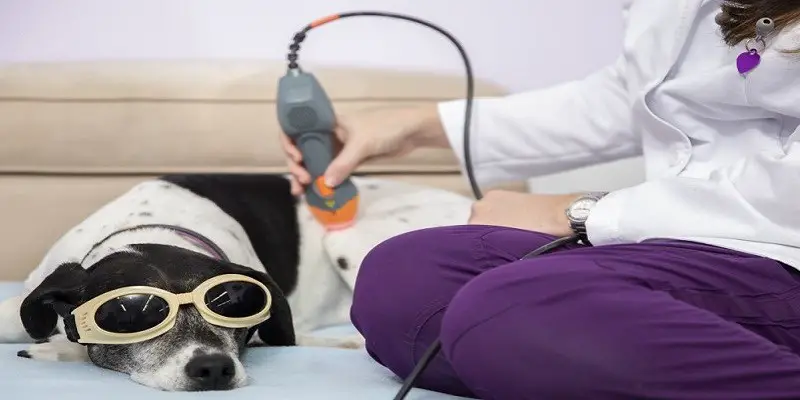In today’s world, lasers are all around us, but did you know that they can also help our dogs feel better? Laser therapy is an emerging field of veterinary medicine that is popular for treating various dog conditions.
Laser therapy: science and technology
Primarily, a laser is a source of light and energy. By amplification of light, lasers, or more specifically optical amplifiers, produce electromagnetic radiation. Actually, the word “laser” stands for “light amplification of stimulated emission of radiation.” Despite this, not every laser is the same.
There are four classes of lasers recognized by the FDA based on wavelength and energy output. Essentially, lasers are classified based on how powerful they are and their intended use:
- Class 1 emits the least power and is the safest for everyday use.
- Class 2 lasers produce visible light beams and are more powerful than class 1 lasers.
- Class 3 lasers pose moderate ocular safety risks. The majority of therapeutic lasers fall into this category.
- Lasers of class 4 are very powerful and can cause severe eye damage and skin damage.
Laser technology influences many aspects of everyday life. From shopping to DVD viewing to document printing, lasers benefit us in many ways. Both veterinary and human medicine use lasers to treat a variety of conditions. Laser therapy for dogs is an emerging treatment modality for a variety of conditions.
There are many uses for laser therapy
Laser therapy—also known as cold laser therapy (LLLT)—“is the application of light to a biologic system to promote tissue regeneration, reduce inflammation and relieve pain.”1 LLLT affects body tissues at a cellular level, stimulating benefits like increased blood flow, lymphatic drainage, collagen and enzyme production, and endorphin release. Healing, nerve regeneration, and pain relief are enhanced as a result.
Laser therapy is used by dermatologists, veterinarians, dentists, physical therapists, and other medical professionals to relieve pain, inflammation, and wounds.
Laser therapy for dogs has many benefits
A veterinarian may recommend laser therapy treatments, including laser therapy for dogs at home, as part of a multi-modal approach to treating certain diseases in dogs. Common laser therapy conditions include:
- Osteoarthritis
- Hip or elbow dysplasia
- Intervertebral disc disease
- Tendon, ligament, or muscle injuries
- Surgical wounds
- Lick granulomas
- Allergic skin disease
According to research in this field, laser therapy may be beneficial to many other canine conditions, as well as healing and regenerating effects. It has been shown that laser therapy reduces pain and inflammation, increases patient comfort, and improves wound healing, among other benefits.
As well as offering medical benefits, laser therapy sessions can be completed on an outpatient basis within 15 to 30 minutes. Laser therapy may help your pet achieve results in just a few sessions, depending on his or her condition and your veterinarian’s recommendations.
In pets suffering from long-standing diseases or chronic conditions, treatment may need to be continued for a longer period of time before benefits are realized.
Additionally, laser therapy has an excellent safety profile when used properly and with appropriate eye protection. Laser products can even be purchased and used at home under the guidance of your veterinarian.
To learn more about low-level laser therapy or to see if your dog is a good candidate for treatment, contact your family veterinarian or use different cold laser therapy devices for dogs.
References:
- https://www.ncbi.nlm.nih.gov/pmc/articles/PMC4291815/
- https://www.veterinarypracticenews.com/uses-evidence-and-safety-of-laser-therapy/
- https://www.aaha.org/your-pet/pet-owner-education/ask-aaha/laser-therapy/
Read More
- Why Abandon A Dog When You Can Sell It
- 10 Safety Tips For Walking Your Dog At Night
- Ultimate Guide To The Care & Cleaning Of Your Dog’s Toys
Last Updated on May 10, 2025 by Pauline G. Carter

